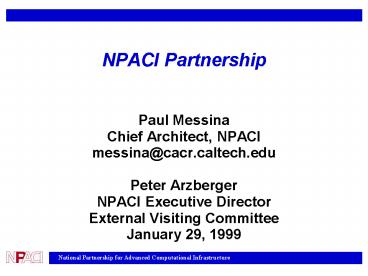NPACI Partnership - PowerPoint PPT Presentation
1 / 15
Title:
NPACI Partnership
Description:
Projects provide multidisciplinary setting for identifying, implementing, and ... Projects are composed of applications and technology people ... – PowerPoint PPT presentation
Number of Views:36
Avg rating:3.0/5.0
Title: NPACI Partnership
1
NPACI Partnership
- Paul Messina
- Chief Architect, NPACI
- messina_at_cacr.caltech.edu
- Peter Arzberger
- NPACI Executive Director
- External Visiting Committee
- January 29, 1999
2
Partnership goal
- Creating a ubiquitous, continuous, pervasive HPCC
infrastructure - Infrastructure people, software, and hardware
3
Design of the partnership
- Based on a vision of new capabilities for CSE
- Selected, for infrastructure development,
technology areas that are -- or promise to be --
crucial for many applications - Identified areas with important applications and
in which NPACI partners have particular strengths
to guide development
4
Partnership Organizing PrincipleMultidisciplina
ry Thrusts
- Application Thrusts
- Molecular Science
- Neuroscience
- Earth Systems Science
- Engineering
- Technology Thrusts
- Metasystems
- Programming Tools Environments
- Data-intensive Computing
- Interactive Environments
5
NPACI management team
Executive Committee
Leadership Team
- Click to edit Master text styles
- Second level
- Third level
Sid Karin Director
Peter Arzberger Executive Director
Paul Messina Chief Architect
Susan Graham Chief Computer Scientist
Peter Taylor Chief Applications Scientist
Wayne Pfeiffer Deputy Director
Greg Moses EOT Thrust Leader
Applications Thrust Leaders Russ Altman,
MoleSci Mark Ellisman, Neuro, Cross-Dis
Coord Bernard Minster, ESS Tinsley Oden, Eng
Enabling Technologies Thrust Leaders Andrew
Grimshaw, Meta Joel Saltz, PTE Reagan Moore,
DICE Arthur Olson, IE
Member at Large Bill Martin Jim Pool
6
Multidisciplinary approach
- Thrusts are our organizing principle
- Provide expertise and focus for individual areas
- Enhanced infrastructure results from applications
push and technology pull - Projects provide multidisciplinary setting for
identifying, implementing, and testing new
infrastructure - Projects are composed of applications and
technology people - Multidisciplinary activities are a contact sport!
7
Projects implement the multidisciplinary approach
- Application thrusts identify
- Aspects of the HPC technologies that limit
progress in computational science engineering
work - Specific problems not solvable with current
infrastructure that would be enabled with
enhanced infrastructure
8
Projects meld applications and technology
Brain databases
Data-IntensiveComputingNeuroscience
MetasystemsEarth SystemsScience
Global climate modeling
9
Project mode of operation
- Select specific CSE application problem to be
solved - Proves new infrastructure really works
- Exciting science and engineering results motivate
others to use the new infrastructure - Formulate plans with timelines and milestones
for developing the targeted capability
10
Resource and EOT thrusts
- Resources
- Provide new capabilities for pursuing CSE and
Computer Science - Enable production use of new technologies
(hardware and software) for applications - Education, Outreach, and Training
- Enhance and enlarge the people component of
infrastructure - Dovetail with technology and applications thrusts
- Explore the use of HPCC in new communities
11
Enhancing the infrastructure
- Technology thrusts review solutions developed
across applications - Generalize what we learn and develop for the
benefit of the entire research community - Develop solutions that have general applicability
- Integrate resulting technology into
infrastructure - Enable re-use of software, algorithms
- Integrate individual enabling technologies into a
coherent environment
12
Creating the new infrastructure
- Prototype systems must be built and tested using
NPACI compute, data, and networking resources - This user community is different from traditional
supercomputer center users - The compute partners have assigned people to
install and provide front-line support for the
software under development - Once new NPACI-developed software is sturdy
enough, it becomes part of infrastructure - Work with vendors to provide similar functionality
13
Partners are of several types
14
Evolution of partnership
- Even in its first year, the composition of
partnership has evolved - International affiliates add expertise and
resources in selected areas - In each case, specific activities form the basis
of the affiliation - Several sites changed from associate to
development partners due to - Movement of people
- Identification of groups that strengthen or
broaden thrusts
15
NPACI is a real partnership
- All projects involve multiple NPACI partners
- Executive Committee actively manages and
allocates resources - Reviews all thrusts continuously
- Selects activities to be initiated, redirected,
terminated - Members are multi-site, multidisciplinary
- 10 partner institutions represented by its 16
members

